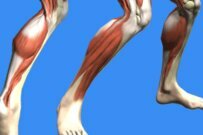 Image Source: http://www.frozenshoulder.com/images/shoulder_capsule_image.jpg
Image Source: http://www.frozenshoulder.com/images/shoulder_capsule_image.jpg
Frozen shoulder, also known as adhesive capsulitis, is a condition characterized by stiffness and pain in your shoulder joint as a result of swelling of the articular shoulder capsule, restricting its mobility. Symptoms usually begin gradually and then worsen over time and then resolve, often within one or two years.
Risk of developing frozen shoulder increases when recovering from a medical condition or procedure that inhibits the mobility of your arm such as a stroke or a mastectomy. Frozen shoulder appears to occur most frequently in people between 40 and 50 and occurs in women more often than men.
Most frozen shoulder treatments involve controlling shoulder pain and maintaining as much range of motion in the shoulder as possible. Physical therapy, massage therapy, acupuncture, stretching exercises and, sometimes, steroid injections into the joint capsule are all used to treat frozen shoulder by controlling pain and improving range of motion.
Sources: http://www.mayoclinic.com/health/frozen-shoulder/DS00416/DSECTION=prevention
http://www.medicalnewstoday.com/articles/166186.php





